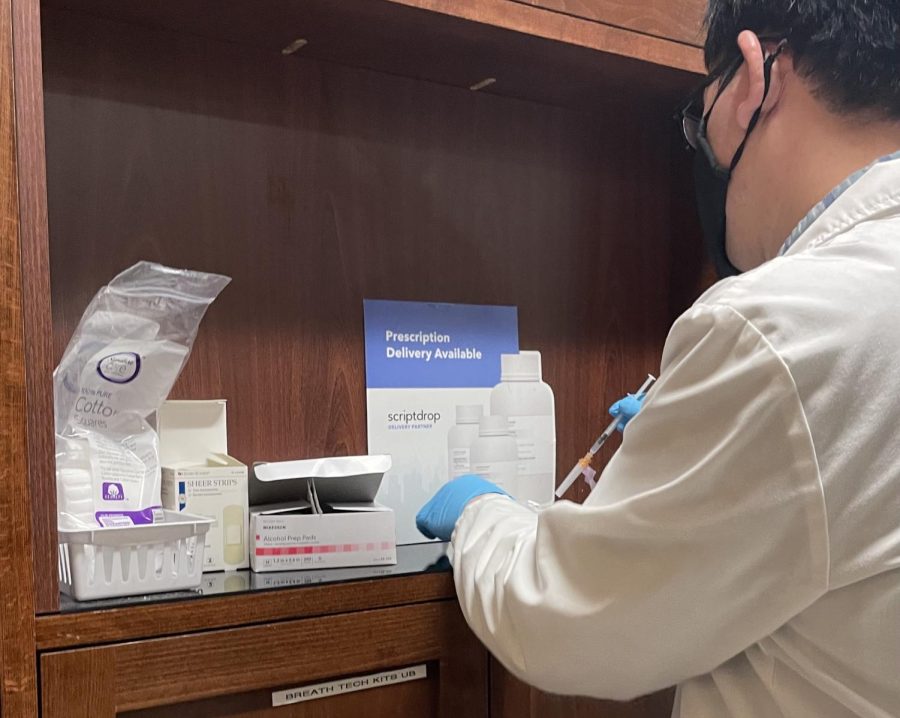FDA authorizes Pfizer COVID-19 booster shot for individuals aged 12 to 15
A pharmacist prepares a Pfizer booster shot on January 15 at the Los Gatos Safeway Pharmacy. The FDA approved of administration of the booster to children aged 12 to 15 on January 3.
January 15, 2022
The Food and Drug Administration (FDA) expanded the availability of the Pfizer-BioNTech COVID-19 booster vaccine to children between ages 12 and 15 on Jan. 3.
This authorization followed after the FDA reviewed data from Israel that revealed no new risks associated with the booster dose for individuals in this age range.
Along with lowering the age requirement for the booster dose, the FDA shortened the time required between receiving the second primary vaccine dose and the booster dose from six to five months and also authorized a third dose of the vaccine for immunocompromised children aged five to 11.
“In particular, the omicron variant appears to be more resistant to the antibody levels produced in response to the primary series doses from the current vaccines,” said Peter Marks, director of the FDA’s Center for Biologics Evaluation and Research, in an FDA news release. “With this in mind, the FDA has extended the range of individuals eligible to receive a booster, shortened the length of time between the completion of the Pfizer primary series for individuals to receive a booster and is authorizing a third protective vaccine dose for some of our youngest and most vulnerable individuals.”
A total of 526 million booster shots have been administered in the U.S. as of Jan. 15. Sophomore Arjun Gurjar received his first two doses of the Pfizer vaccine last spring and his booster on Jan. 9.
“I got the booster because it provides extra immunity, and there’s no downside to doing it,” Arjun said. “I had no side effects besides some pain in my arm that was very mild. I’m still slightly wary going to school, but more or less, I feel safe, especially with the booster.”
Data from clinical trials shows that those who received the booster shot six months after the primary dosage of Pfizer or Moderna or two months after the primary dosage of Johnson and Johnson demonstrated an increased immune response to the virus.
“There’s good reason to believe that we will need to be boosted pretty regularly in the future, but how that plays out is going to depend a lot on how the virus has evolved, as well as how the booster has evolved,” upper school biology teacher Mike Pistacchi said. “Pfizer just announced that by March, they’ll have a booster that’s omicron specific. So the question is going to be, ‘should we get that one? Does it matter and is it helpful?’”


















![“[Building nerf blasters] became this outlet of creativity for me that hasn't been matched by anything else. The process [of] making a build complete to your desire is such a painstakingly difficult process, but I've had to learn from [the skills needed from] soldering to proper painting. There's so many different options for everything, if you think about it, it exists. The best part is [that] if it doesn't exist, you can build it yourself," Ishaan Parate said.](https://harkeraquila.com/wp-content/uploads/2022/08/DSC_8149-900x604.jpg)




![“When I came into high school, I was ready to be a follower. But DECA was a game changer for me. It helped me overcome my fear of public speaking, and it's played such a major role in who I've become today. To be able to successfully lead a chapter of 150 students, an officer team and be one of the upperclassmen I once really admired is something I'm [really] proud of,” Anvitha Tummala ('21) said.](https://harkeraquila.com/wp-content/uploads/2021/07/Screen-Shot-2021-07-25-at-9.50.05-AM-900x594.png)







![“I think getting up in the morning and having a sense of purpose [is exciting]. I think without a certain amount of drive, life is kind of obsolete and mundane, and I think having that every single day is what makes each day unique and kind of makes life exciting,” Neymika Jain (12) said.](https://harkeraquila.com/wp-content/uploads/2017/06/Screen-Shot-2017-06-03-at-4.54.16-PM.png)








![“My slogan is ‘slow feet, don’t eat, and I’m hungry.’ You need to run fast to get where you are–you aren't going to get those championships if you aren't fast,” Angel Cervantes (12) said. “I want to do well in school on my tests and in track and win championships for my team. I live by that, [and] I can do that anywhere: in the classroom or on the field.”](https://harkeraquila.com/wp-content/uploads/2018/06/DSC5146-900x601.jpg)
![“[Volleyball has] taught me how to fall correctly, and another thing it taught is that you don’t have to be the best at something to be good at it. If you just hit the ball in a smart way, then it still scores points and you’re good at it. You could be a background player and still make a much bigger impact on the team than you would think,” Anya Gert (’20) said.](https://harkeraquila.com/wp-content/uploads/2020/06/AnnaGert_JinTuan_HoHPhotoEdited-600x900.jpeg)

![“I'm not nearly there yet, but [my confidence has] definitely been getting better since I was pretty shy and timid coming into Harker my freshman year. I know that there's a lot of people that are really confident in what they do, and I really admire them. Everyone's so driven and that has really pushed me to kind of try to find my own place in high school and be more confident,” Alyssa Huang (’20) said.](https://harkeraquila.com/wp-content/uploads/2020/06/AlyssaHuang_EmilyChen_HoHPhoto-900x749.jpeg)












